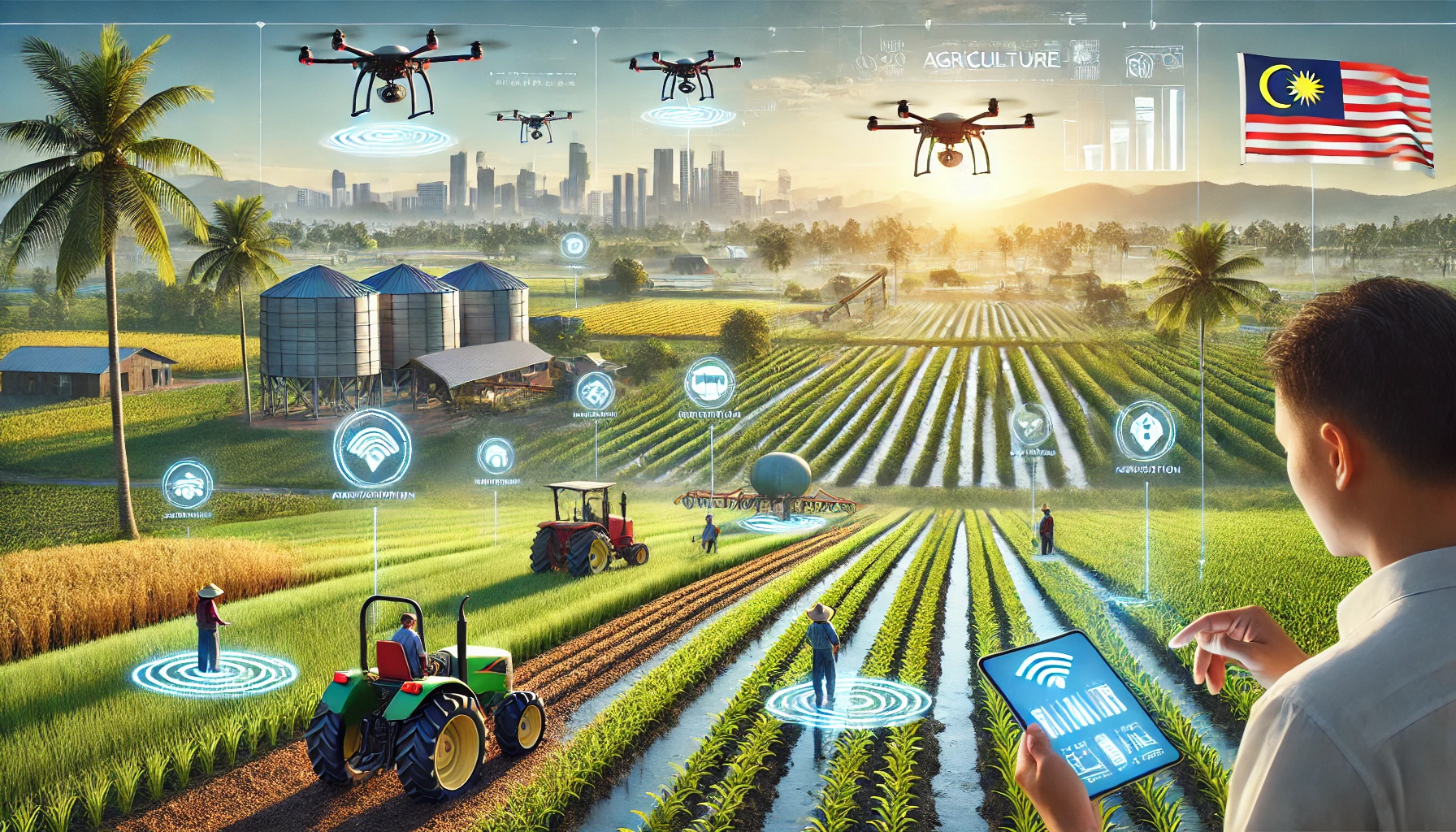Boosting Malaysia’s Agricultural Future: Digital Technologies and Economic Growth in 2024
The report highlights Malaysia’s strong economic growth in 2024 and the potential of Digital Agricultural Technologies (DATs) to boost agricultural resilience and productivity. It emphasizes the need for strategic investments, innovation, and inclusive policies to sustain growth and improve food security.

Research produced by the World Bank focuses on Malaysia’s economic trajectory and the potential for digital technologies to enhance agricultural resilience. The paper highlights Malaysia's robust economic performance in the first half of 2024. The economy grew strongly, driven by household consumption, increased investments, and improved export performance. Malaysia's GDP is projected to grow by 4.9% in 2024, a notable improvement from 3.6% in 2023. The World Bank team, led by Chong Yew Keat and Deisigan Shammugam, collaborated with various experts and Malaysian government agencies to produce this report, which outlines the opportunities and challenges facing the country, particularly in the agricultural sector.
Economic Growth Amid Fiscal Pressures
Malaysia’s economic recovery comes after a period of global uncertainties and domestic fiscal pressures. The report highlights that inflation is expected to moderate due to softer global commodity prices and weaker-than-anticipated effects of recent policy changes. Despite the positive economic outlook, fiscal space remains limited as rigid expenditures rise, driven by salary adjustments and ongoing subsidy rationalization efforts. The government's ability to optimize public spending and improve revenue mobilization will be crucial for maintaining fiscal sustainability. The focus on the agricultural sector is particularly timely, given its role in contributing 11.6% of GDP in 2023 and employing 1.87 million people. However, the sector faces significant challenges related to productivity, market inefficiencies, and the impacts of climate change. The World Bank emphasizes that addressing these challenges is critical for Malaysia to sustain its economic momentum and achieve its long-term development goals.
Digital Agriculture: A Key to Future Growth
One of the key messages of the report is the transformative potential of Digital Agricultural Technologies (DATs) in modernizing Malaysia’s agrofood systems. The government has outlined a vision to make the agro-food sector globally competitive, improve the well-being of food producers, and reduce the environmental footprint of agriculture. DATs can play a pivotal role in achieving these goals by improving productivity, reducing information asymmetries, and creating better employment opportunities. By leveraging technologies such as precision farming, AI-driven insights, and smart irrigation systems, farmers can increase yields, optimize resource use, and enhance resilience to climate impacts. The report stresses that the successful implementation of DATs will require investments in public goods such as rural connectivity and digital literacy, the creation of innovative ecosystems including data platforms and startup incubators, and the development of an enabling regulatory environment that encourages private sector investment in digital agriculture.
Learning from Global Examples
Global experiences offer valuable lessons for Malaysia’s adoption of DATs. The report cites examples from India, where bundling digital agriculture services has led to increased productivity and market efficiency. Similar initiatives could be adapted to the Malaysian context, particularly in addressing challenges related to high transaction costs and market access for smallholder farmers. Malaysia can also learn from other countries that have used DATs to optimize private sector investments and improve access to finance for farmers. The World Bank report includes case studies of pilot projects, such as super-intensive shrimp farming, that demonstrate the potential financial benefits of adopting digital solutions in agriculture. These pilots offer important insights into how Malaysia can scale up digital agriculture initiatives across the country.
Bridging the Digital Divide in Agriculture
While digital technologies present a promising path forward, the report warns that these innovations must be implemented strategically to avoid exacerbating existing inequalities. The digital divide between urban and rural areas, as well as gender disparities in technology access, could limit the effectiveness of DATs in reaching all farmers. To address this, the report calls for targeted policies that promote inclusive access to digital tools, particularly for women and smallholder farmers. Furthermore, it stresses the need for robust data governance frameworks to protect sensitive agricultural data and ensure that it is used responsibly.
Sustaining Growth Through Innovation
The broader macroeconomic outlook for Malaysia remains positive, but some risks could affect the country’s growth trajectory. Global geopolitical tensions, potential disruptions to commodity markets, and uncertainties in household consumption could all impact Malaysia’s economic performance in the coming years. On the domestic front, the government faces challenges in managing rigid expenditures and rationalizing subsidies without undermining fiscal stability. At the same time, the Malaysian labor market continues to improve, with rising wages and declining unemployment. However, skill-related underemployment remains a significant issue, particularly among young and highly educated workers who are employed in low-skilled jobs. Addressing this underemployment will require a stronger alignment between education and industry needs, as well as policies that promote high-skilled job creation.
Overall, the study emphasizes the importance of sustaining economic growth through innovation and digital transformation. The report concludes that by harnessing the power of digital technologies in agriculture, Malaysia can improve food security, enhance resilience to climate change, and create new economic opportunities for its rural population. However, these efforts must be accompanied by sound fiscal policies, investments in public goods, and a commitment to addressing structural challenges in the labor market.
- FIRST PUBLISHED IN:
- Devdiscourse
ALSO READ
World Bank Approves Strategic Partnership to Boost Suriname’s Economic Resilience and Inclusive Growth
World Bank Approves $56M Project to Enhance Road Connectivity and Climate Resilience in Central and Southern Laos
World Bank Unveils 'Business Ready' Report Revamping Investment Climate Assessments
World Bank's Revamped Business Ready Survey Ranks Top Economies
World Bank Faces Declining Perceptions in Guinea-Bissau Amid Calls for Stronger Engagement










